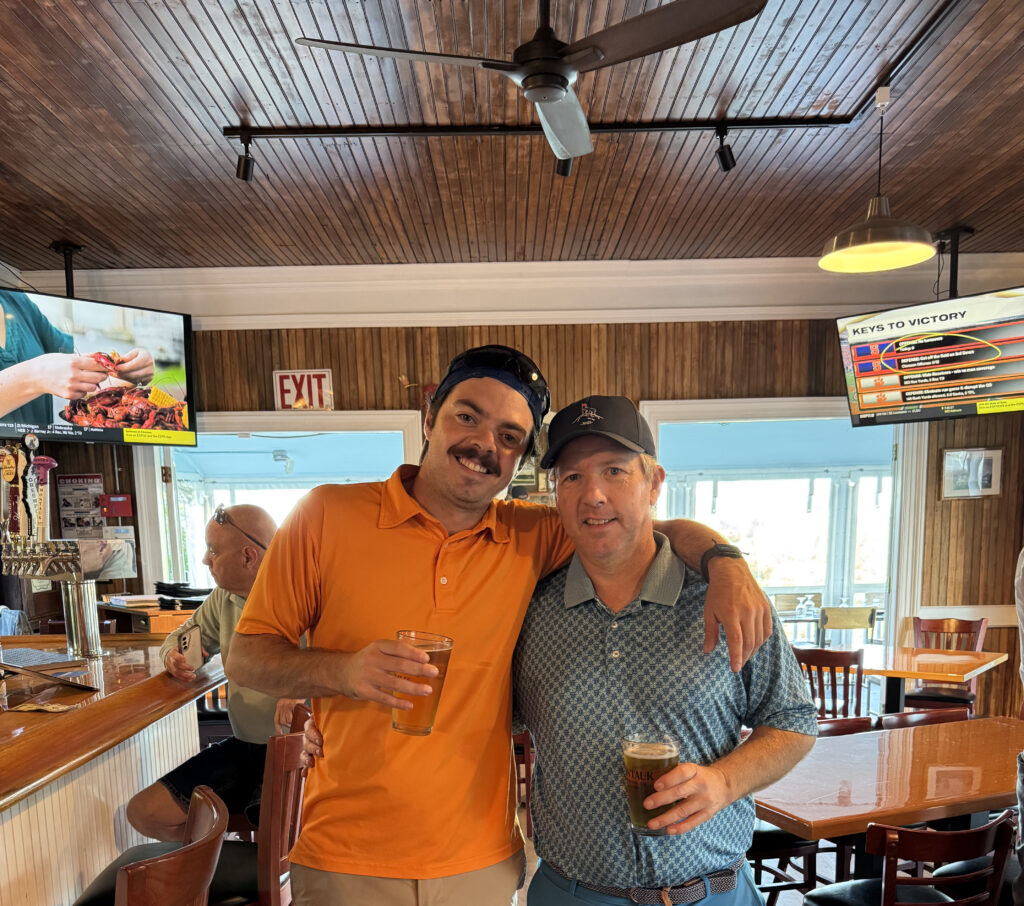‘The Daddy Ferry:’ A Shelter Island remembrance

Some 70 years ago, a chance conversation between two young mothers in a New York City park’s playground resulted in my parents taking a much-needed, adults-only respite on an island they had never heard of.
They spent the weekend at The Chequit, and that’s all it took for them to be immediately and irretrievably smitten by an obscure Long Island backwater.
A couple of years later, in the summer of 1960, they took a two-week rental of a rambling Shorewood cottage on Clark’s Creek, which was originally part of the old Artemis Ward estate, and then a part of Jack and Jeanne Garr’s extensive real estate holdings.
It was called the Catalpa House, after the non-native trees that had been planted throughout Ward’s property, and still thrive there.
Mary Travers, of the legendary folk group Peter, Paul and Mary, summered in the house several years before that, well before her career took off. She is remembered as a beautiful blond-tressed teen who rode her horse bareback all over the Island, guitar slung over her shoulder.
Remarkably, my mother’s therapist also rented a house around the same time my parents did. My mom accidentally discovered this when the therapist’s phone bill showed up in the roadside mailbox shared by all Shorewood residents.
With indignation commingled with puzzlement, she confronted him with this incredible coincidence and the fact that he knew all along but neglected to tell her. He dispassionately replied that the therapeutic process was about her, not him.
My family was comfortably middle-class. My father was on his way to being a successful and well-respected magazine editor and my mother was a stay-at-home mom. Long lost to time is how much rent my parents paid for a two-week stint on Shelter Island in August 1960.
Whatever it cost, I can’t imagine they would’ve been able to afford more than a couple of hundred dollars.
In the following years they rented the house for the whole month of August until, in 1966, Ms. Garr gave them an ultimatum: “Are you gonna buy this house, or what?” (Ms. Garr was renowned for selling a house or two whenever expenses or the taxman required.)
The purchase price was gargantuan and definitely out of reach. Crestfallen, my parents regretfully told her that there was no way they could meet her asking price.
Those who remember Jeanne Garr and her business acumen will not be surprised at what followed. She commenced to show my parents, with my sister and me in tow, a couple of her C-plus properties that were perhaps more suitable for penny-pinchers like them.
Upon seeing these alternative properties, we, as a family, were horrified. I remember my sister and I (8 and 10, respectively) pleading with our parents: “No, no, no! We want our house!” In other words, once my family had experienced six Augusts in our beloved, quirky, funky, ramshackle, six-bedroom summer cottage, there was no way my parents would ever consider purchasing an utterly charmless — albeit less-expensive — substitute.
Our parents somehow managed to scrape together the down payment and “our” house was now truly ours — forever.
Every summer thereafter, after school let out in June, we’d jam a summer’s worth of stuff into a huge, rented station wagon and head off to a glorious island sheltered by islands. My mother, sister and I would stay until Labor Day, with my father coming out every weekend and then, in August, for a solid two weeks.
This arrangement was far from exclusive to our family. Across the Island, it was replicated by scores of summer people. This was the 1960s, and families with two income-earners were rare; for the most part, mothers were housewives and fathers worked all week in the City.
It’s hard to believe now, but owning a summer home on Shelter Island was not out of reach for many middle-class families.
Back in the days when every new Long Island Expressway exit beyond 52 was a miracle of modern road-building, driving all the way from the City to the East End, especially on a hot Friday evening, was not an option considered by many fathers.
Thankfully, the Long Island Railroad — then as now — terminated in Greenport and, to the benefit of those inclined, each train boasted a bar car. As I recall, my father was inclined.
Throughout the 20th century, every summer Friday, a mass of fathers clambered aboard the same evening train and headed to their families waiting anxiously on an island paradise.

In my youth, mothers and their properly-fed and bathed kids would pile into their cars and head down to the North Ferry and, as the summer sun set, wait for the LIRR train packed with the fathers to arrive, the youngest in the family already in pajamas.
I clearly remember my mother meeting up and chatting away with her friends, who were the mothers of my friends, the air freighted with anticipation.
All the kids would be looking out across the water — first to catch sight of the train arriving in the Greenport Station (“It’s here! It’s here!”) and then, approximately 10 minutes later, for the Daddy Ferry, its bow filled with maybe 20-30 sweaty fathers (daddies took precedence over cars), ties loosened, reveling in a Shelter Island breeze that evaporated the memory of a four-hour, bone-jostling train trip invariably accompanied by malfunctioning air-conditioning.
To this day, my chest swells with pride when I recall those summer Fridays, year after year. In my memory, my father was the first father to disembark the Daddy Ferry — every single time.
As the ferry tied up to the Shelter Island slip and the deck hands slid the solid steel doors apart, my father would bound down the ramp to our waiting embraces.
I never questioned why my father wanted or needed to be the first daddy off the boat; he just was. Looking back, I think an explanation as good as any is that he also wanted to be the first car out of the crowded parking lot and not waste any time getting to the Catalpa House, our house on the other side of the Island, so that he could change out of his sweaty suit, grab a scotch and water, put some Louis Armstrong on the record player, sit on an Adirondack chair on the porch, and sigh a contented sigh.
In the summer of 1977, when I was in college, I worked at the Ram’s Head Inn. Minimum wage, $2.30 an hour. I was a handyman during the day and washed dishes at night.
I saved my wages because all I did was work and sleep. A girl my age, Mary-Ellen, worked in the kitchen, too, doing prep work in the afternoon and then, all night, ably assisting the chef, who was a jerk.
One night, during a lull in the dinner action, we discovered that we both shared happy, vivid childhood memories of the Daddy Ferry and how, as little kids, we’d be bursting with excitement over the arrival of our fathers, who had been gone for a nearly-interminable five days.
I hadn’t thought about it in ages and was delighted to share the recollection with a contemporary who knew precisely what I was talking about.
Beaming with pride I informed her then, years after the fact, that my father was always the first father off the Daddy Ferry. A wave of recognition instantly shot across her face and she yelled at me, “That [expletive] was your father? Every single summer Friday, year after year, I begged my father to be, just once, the first daddy off the ferry.”
Her consternation was genuine and, though a smile remained on my face throughout, I felt slightly self-conscious. The indisputable fact remained, however, that my father was the leader of the pack, the first off the Daddy Ferry and the first to fly into the waiting arms of his family.
Every. Single. Time.









